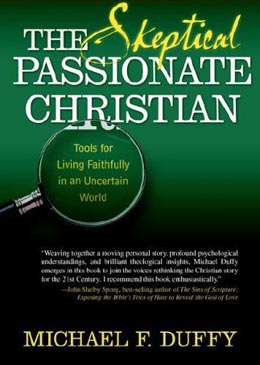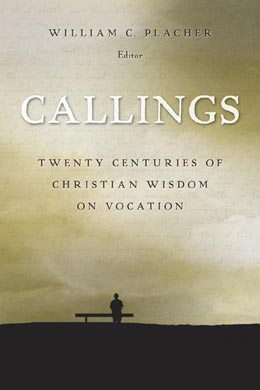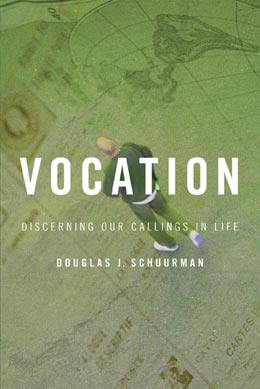Some characterize American culture as post-Christian. Whether this is completely accurate or not, it does capture a general sense that Christian faith does not easily comport with contemporary life. For example, the primary assumptions that ground Christian faith–grace, love, and service–seem utterly foreign to the rhetoric that shapes the work environments of most Americans, identified as they are with merit, competition, and self-interest. Whether I am speaking with undergraduates or adults, relating their Christian faith to their lives in the wider world is mindbogglingly difficult. They long for an integrated life of Christian faithfulness, but have a deep sense of fragmentation and conflict.
Unfortunately, the churches do not seem to be offering much help. The mainline churches, at least, feel radically beleaguered. Facing budget cuts, a shrinking membership, and an increasingly diverse and secular society that often considers them irrelevant, many churches are tempted to turn inward. There is a tendency to concentrate on maintaining the internal life of the church, while providing Christians with few resources to help them interpret their lives as a whole in a Christian manner. More and more, then, we face the fragmentation of our lives, identities, and communities. In an understandable response to these realities, there is a nostalgic effort, particularly among conservative evangelical churches, to recover a simple unity between Christian faith and American life by imposing Christian symbols and values upon the wider culture through power politics.
What is required, however, is neither beleaguered retreat nor forceful assertion, but deep reflection on the shape of Christian faithfulness for a new cultural context. Recent and growing attention to the language of vocation, promoted in signifi- cant part by the Lilly Endowment, is providing resources for such reflection within the churches and among Christians. The three recently published books reviewed here contribute to this sort of reflection by placing the resources of the Christian tradition concerning vocation in conversation with the particular challenges of contemporary living.
The Skeptical, Passionate Christian: Tools for Living Faithfully in an Uncertain World is, in form and substance, committed to the proposition that theology is a practical endeavor for all Christians.  Written in a conversational tone that avoids academic and theological jargon, it invites all of us, however skeptical, to engage passionately in reflection on our faith, understood as “our fundamental orientation to life, the basic stance we take when we face the world” (2). There is no escape from the practical need for human beings to orient themselves in the world and for Christians to orient themselves Christianly. Given the challenges of contemporary existence, however, such explorations entail ambiguity, uncertainty, and conflict.
Written in a conversational tone that avoids academic and theological jargon, it invites all of us, however skeptical, to engage passionately in reflection on our faith, understood as “our fundamental orientation to life, the basic stance we take when we face the world” (2). There is no escape from the practical need for human beings to orient themselves in the world and for Christians to orient themselves Christianly. Given the challenges of contemporary existence, however, such explorations entail ambiguity, uncertainty, and conflict.
For those who are intimidated or frightened by the thickets of theological reflection, Michael Duffy is a sensitive and helpful guide. He gently leads readers through difficult terrain by revealing some of his own most profound questions and agonizing doubts as well as the personal experiences that gave rise to them. And, like any good guide, he provides guideposts along the way by means of a clear and direct theological method. Finally, he encourages readers to explore the territory of their own faith through a variety of exercises and questions along the journey together. While the first half of the book explores faith and theological reflection on faith generally, the second half delves into the topic of vocation, asking readers to explore what it means to be responsive to God in their everyday roles and responsibilities.
Michael Duffy neither provides answers nor resolves the ambiguity and tension. Finishing the book, the reader has a greater sense that the journey is just beginning than that it has reached its conclusion. And that is in fact the case. Michael Duffy’s book provides people with resources for the ambiguous, uncertain journey of living a Christian life in the contemporary world. Thus it is a wonderful text for a church group or an introductory undergraduate class in which people are learning to think theologically about their lives and world.
One of the greatest virtues of the book is that it embodies the conviction that theology is a communal endeavor. This can be seen, first, in the innovative way Duffy creates a dialogue between the author and reader. But it is also seen in his method which provides a process for clarifying the relevant theological questions and why they are important, and then engages in dialogue with, what he calls, important “partners in Christian conversation.” These include the Bible, the Christian tradition, contemporary Christian theology, experience, and non-Christian traditions and ways of knowing. While he presents faith as an existential and very personal journey on the one hand, he also encourages the reader to see faith as a pilgrimage that is not taken in isolation. Orienting ourselves in the world is not an intuitive, internal matter, but a communal endeavor that stretches across time, space, and tradition. The implication is that we are all seeking to know and respond to the same reality and that we have much to learn from one another.
The greatest weakness of the book, however, is that Duffy goes too far in embracing a post-modern, pragmatist conception of theology. His criticism of the correspondence theory of truth is accurate and helpful. We cannot expect that the theological endeavor will lead to a full and trustworthy possession of the Truth–the way things actually are in the world. Given the nature of our existence, we need to be more humble and become more comfortable with ambiguity and uncertainty. Nevertheless, Duffy goes too far when he says that “Theological analysis is not the study of God; God, assuming there is one, may or may not be accessible to us. God-talk is, as far as we can know, about us, about human beings” (184). The problem here, it seems to this reviewer, is that this post-modern, pragmatist move cuts the nerve at the heart of the endeavor to which he has so wonderfully introduced his readers. Theology is the investigation of God and God’s way with the world. It is only about us in the secondary sense that by coming to a clearer understanding of God we may more faithfully live our lives in response to this God. Basic to the theological endeavor and the Christian life is the conviction that God and God’s ways are accessible to us in some limited but significant sense. Apart from this, theology and Christian faith fall prey to Feuerbach’s critique that language about God is nothing but navel-gazing and wish-fulfillment. Nevertheless, because of the discursive nature of the book, this criticism is not fatal to Duffy’s endeavor. Entering into debate with Duffy about his convictions and in the process clarifying one’s own, in the context of dialogue with the Christian tradition, Christian experience, and non-Christian conversation partners, is the joy and promise of this book.
Duffy introduces the theological endeavor and begins the conversation with various theological partners about vocation, but the very nature of the book does not allow a full or thorough exploration.  Those who want to delve deeper into the Christian tradition’s understanding of vocation will find William Placher’sCallings: Twenty Centuries of Christian Wisdom on Vocation an indispensable resource. This wonderful collection draws from the breadth and depth of Christian reflection on calling, moving far beyond the 16th century Reformers and 17th century Puritans who are, so often, the sole conversation partners in contemporary discussions of vocation. The Martyrdom of Perpetua, for example, is unlikely to spring to mind as an important resource for thinking about vocation. Yet Placher includes it, along with many other improbable entries, encouraging us to broaden our defi- nition of vocation and list of conversation partners.
Those who want to delve deeper into the Christian tradition’s understanding of vocation will find William Placher’sCallings: Twenty Centuries of Christian Wisdom on Vocation an indispensable resource. This wonderful collection draws from the breadth and depth of Christian reflection on calling, moving far beyond the 16th century Reformers and 17th century Puritans who are, so often, the sole conversation partners in contemporary discussions of vocation. The Martyrdom of Perpetua, for example, is unlikely to spring to mind as an important resource for thinking about vocation. Yet Placher includes it, along with many other improbable entries, encouraging us to broaden our defi- nition of vocation and list of conversation partners.
Through creative selection, careful editing, and masterfully written introductions, Placher deepens the reader’s understanding of vocation, at least in part, by showing the great diversity of Christian views concerning it. He divides the book into four sections, reflecting four ages of Christian reflection on vocation: the Early Church (100-500); the Middle Ages (500-1500); the Reformation (1500-1800); and the Post- Christian World (1800-Present). Opening each section with a short introduction that describes the distinctive features of the age, Placher prepares the reader to inhabit, for a moment, a time and place different from her own and the fundamental questions of vocation it provoked. Despite all the differences of circumstance and outlook, however, Placher makes clear that Christians were always asking the fundamental questions, “Is there something God wants me to do with my life? What is it? How can I be sure?”(10).
Working through this book, the reader cannot help but realize that being a Christian in America in the 21st century is different from being a Christian in another time and place. The anxieties provoked by an unprecedented degree of freedom concerning occupation and lifestyle, for example, belong to our age alone. Previously, people did not possess this sort of freedom. Recognizing the distinctiveness of our own age may provoke some to wonder whether the struggles and reflections of those living in other ages are irrelevant, because different. Under Placher’s tutelage, however, such a conclusion is impossible. Awareness of other ages and their challenges both puts the contemporary context in relief, provoking a deeper knowledge of the distinctive issues Christians face today, and relativizes it, pressing us to place our lives and struggles within the larger, more profound, story of the Christian community through the ages. Collecting readings from Justin Martyr to Augustine, from Benedict of Nursia to Thomas Aquinas, from Martin Luther to Gerrard Winstanley, and from Horace Bushnell to Dorothy Day, Placher invites us into a rich and diverse community of those seeking to know and follow God in their own ambiguous context so that we might better discern God’s claim upon us in our uncertain age. In this sense it makes a wonderful companion for the journey into which Duffy has initiated us.
Of the volumes reviewed here, Vocation: Discerning Our Callings in Life is the most theologically nuanced and practically helpful. It is also the most difficult, though definitely worth the effort for college undergraduates, pastors, and motivated lay-people.  At the heart of the book is the message that vocation implies that all of life is holy and lived in relationship to God. In order to convey this message, Schuurman takes on both contemporary culture, which undermines a sense of the sacredness of daily life due to secularism and materialism, and the theological critics of vocation, such as Miraslov Volf, Stanley Hauerwas, Gary Babcock, and Jacques Ellul. The promise of vocation today, Schuurman contends, is to provide a sense of meaning, unity, and holiness to life.
At the heart of the book is the message that vocation implies that all of life is holy and lived in relationship to God. In order to convey this message, Schuurman takes on both contemporary culture, which undermines a sense of the sacredness of daily life due to secularism and materialism, and the theological critics of vocation, such as Miraslov Volf, Stanley Hauerwas, Gary Babcock, and Jacques Ellul. The promise of vocation today, Schuurman contends, is to provide a sense of meaning, unity, and holiness to life.
If God is the God of the whole universe and God’s eschatological goal is all-encompassing, Schuurman contends, then Christians must see everything as related to God and orient their entire existence toward God’s eschatological goal. Central to the book is an account of the religious affections of dependence, gratitude, obligation, and meaning. Human beings are recipients of God’s gracious providence, which prompts gratitude for what they have received and an obligation to use it to serve others. Vocation is the expression of gratitude to God and service to neighbor in every aspect of life, even the most mundane. This general sensibility, according to Schuurman, provides all the disparate aspects of life with a unified sense of meaning and purpose.
This is not to say that ambiguity, complexity, and dissonance are easily overcome. Schuurman is well aware of the persistence of human sinfulness, which corrupts the various spheres of life to which the concept of vocation is applied. Moreover, the language of vocation itself is prone to certain abuses and misuses. For example, it can imbue work with a level of significance that is unwarranted and idolatrous. It can also justify a conservative conformity to the status quo within and among the various spheres of life. Given the reality of human sinfulness, Schuurman reminds the reader that vocation not only imbues all of life with spiritual meaning and religious significance, but also entails a transformation of all of its aspects, pressing them towards conformity with God’s good purposes and eschatological intentions for all creation.
Schuurman’s book offers practical help for people attempting to live all aspects of life in relation to God. For example, he offers guidelines for people making pivotal decisions about their lives in the spheres of work, family, and community. He also warns against certain misconceptions and tendencies, such as imagining that God has a rigid and highly detailed blueprint for our lives. Like the other books, however, it does not provide an escape from the ambiguity of Christian life in God’s good, but fallen world. And this is appropriate. To do otherwise would offer false consolation and strip the Christian life of the vitality, joy, and wonder of relationship with a living God.
Though they are very different, each of these books makes a significant contribution to reviving the language of vocation for life in the contemporary context. Read together, they offer a well-rounded and diverse introduction to the topic of vocation and, more importantly, to the endeavor of living Christianly amidst all the ambiguities, conflicts, and challenges of contemporary existence. I could easily see an undergraduate course in theology, a group of pastors, or a committed Sunday School class reading these books in conjunction and thereby transforming that old Chinese curse into a blessing.
